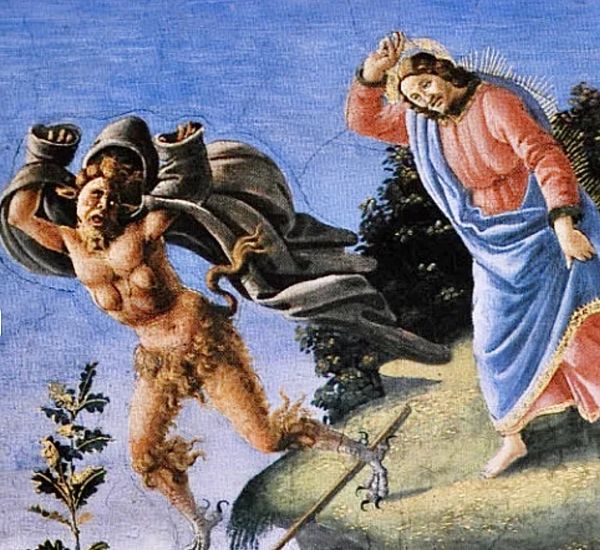The enemy suggests to the Son of God a different way from the Father, but Jesus shrugs off that stench.
Francis' life had undergone a radical change when the Physician Jesus had spoken to him.
The Poor Man had realised that he was loved and that, by following Him, he would be healed from self-worship to render it to God alone.
The Crucifix at San Damiano and the leper he had met had changed him inwardly.
The Minim of Assisi devoted himself to frequent fasts and nights in prayer, for periods of forty days (in consonance with the forty days Jesus spent in the desert).
He did this often - apart from the period before Easter.
At those times he would suspend his apostolic commitments, retiring to hermitages: simple and austere places, far from the cities.
There, as his biographer Celano recalls, he would build his nest in the clefts of the rock*.
The Sources chronicle his Lenten periods, where he was often put to the test.
"Two years before he rendered his spirit to God, after many and various labours, divine Providence drew him aside and led him to a lofty mountain, called the mountain of La Verna.
Here he had begun, according to his custom, to fast during Lent in honour of St Michael the Archangel, when he began to feel flooded with extraordinary sweetness in contemplation, inflamed by a more lively flame of celestial desires, filled with richer divine gifts [...] intent on seeking God's will, to which he yearned with the greatest ardour to conform himself in everything" (FF1223).
La Verna was par excellence "the desert" of Francis, where, as happened to Jesus in arid places, he was subjected to oppressive temptations.
While the Saint was in prayer, there "came a great multitude of ferocious demons [...] and they began strongly to fight and vex him" (FF 1901).
But he began to shout aloud:
"O damned spirits, you can do nothing except as much as the hand of God permits you [...] And I am prepared to cheerfully endure every punishment and every adversity that you, my God, want to send me for my sins".
Then the demons, confused and overcome by his constancy and patience, departed" (FF 1901).
He fed more than on material bread on that of the Holy Word and taught his brothers to adore God alone, wherever they were, trusting in divine care and solicitude.
In fact, his sons, faithful to Francis' exhortation, when they passed near a church, would stop and prone, with body and spirit, adore the Almighty, saying: "We adore you, O Christ, in all your churches" (FF 401).
The power of the Holy Spirit placed them in the right attitude of need, before power or success, just as Christ had instructed them, without allowing themselves to be caged by such seductions.
"It is written: 'The Lord thy God shalt thou worship, and him only shalt thou worship.
"And the Spirit drove him into the wilderness, and he was in the wilderness tempted by Satan, and was with the beasts"
*Famous is the hermitage of the Carceri, near Assisi; in reality Francis created twenty in central Italy.
[1st Sunday in Lent]












